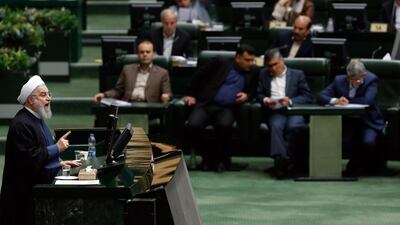As he entered Iran's parliament on Tuesday, Hassan Rouhani may have been wondering where it all went wrong. First elected in 2013 as a moderate, he was overwhelmingly voted back into office four years later on the back of a landmark nuclear deal designed to bring Iran in from the international cold. With America now out of that agreement, however, the atmosphere in Tehran has turned against him.
Parliament rejected the president’s statements on four of five issues of governance on Tuesday. In recent weeks some of the key technocrats in the Rouhani inner circle have been impeached by the Tehran parliament.
Although dominated by conservative factions, parliament's revolt is not knee-jerk. Spurred in part by demonstrations across Iranian cities over corruption and soaring inflation, politicians have set down a roadmap to dump Mr Rouhani as the situation deteriorates.
While not yet at a point of no return, Mr Rouhani is running out of escape routes. One measure of his desperation is that Iran has sued the US under a 1955 treaty struck by the Shah at the UN court.
It seeks to reverse Washington's new sanctions on the grounds the measures were intended to damage the Iranian economy.
Jennifer Newstead, the US lawyer, told the judges that the lawsuit should never have been heard by the court but also confirmed Washington’s intention to put Mr Rouhani’s government under pressure.
"The United States does intend, lawfully and for good reason, to bring heavy pressure to bear on the Iranian leadership to change their ways," she told the hearing on Tuesday "We do this in the interests of US national security as well as in pursuit of a more peaceful Middle East and a more peaceful world."
Beyond the legal gestures, Tehran's leader has put his faith in Europe finding a way to save the 2015 Joint Comprehensive Plan of Action nuclear deal despite the US sanctions.
While Europe has already invoked legislation that bans compliance with the US sanctions, this is a legal instrument that means little in practice. A parade of European companies have withdrawn from deals with Tehran since President Donald Trump announced that sanctions would be rolled back on oil, currency and banking, as well as other trades.
British officials were yesterday reported to be in consultations with the Japanese to share expertise on obtaining waivers from American sanctions. Newspapers reported that high-level meetings at the upcoming G20 would involve the British Treasury holding meetings with its Japanese counterparts.
______________
Read more:
US to act 'very strongly' if Syria uses chemical arms: John Bolton
How Putin is engineering a politically palatable way out of Syria
US 'not seeking regime change in Iran', says John Bolton
_____________
German and French officials are also deeply involved in parallel proposals to keep trading with Iran. Top officials said this week that the 2015 partners are planning to establish independent, state-backed trusts that would use Iranian oil revenues to fund exports from Germany and France to the sanctioned regime.
“With Germany, we are determined to work on an independent European or Franco-German financing tool which would allow us to avoid being the collateral victims of US extraterritorial sanctions,” French Finance Minister Bruno Le Maire said.
Yet France also on Tuesday announced it would suspend non-essential travel by its diplomats to Iran in protest over an Iranian envoy's involvement in a plot to carry out a bomb attack near Paris earlier in the summer.
It is telling Mr Rouhani has reacted to the US withdrawal by criticising the US government but not resorted to the traditional “Death to America” rhetoric that has dominated the republic for the four decades of its existence.
Like the continued outreach to Europe, the distinction preserves Mr Rouhani’s main pledge to Iranian voters, which is he can rehabilitate the country into the global economy.
Speaking to parliament, he even denied that shortages are driving ordinary citizens on the streets.
"It should not be said we are facing a crisis," he announced on Tuesday. "You may talk about employment, foreign currency, recession, smuggling. I think the problem is in people's view of the future.
"The people are not afraid of the United States, they are afraid of our disagreements. If the people see we are united, they will realise the problems will be resolved," he said. "We will not allow a bunch of anti-Iranians who have gathered in the White House to conspire against us."
However, one of the regulators replied that Mr Rouhani was trying to delude his audience with his promises that the JCPOA could be kept alive, either through the UN courts or via Europe’s concessions.
"You created a palace of wishes called the JCPOA," said Mojtaba Zolnour, the member for Qom. "With one kick from Trump, this palace was demolished, and you don't have an alternative."


